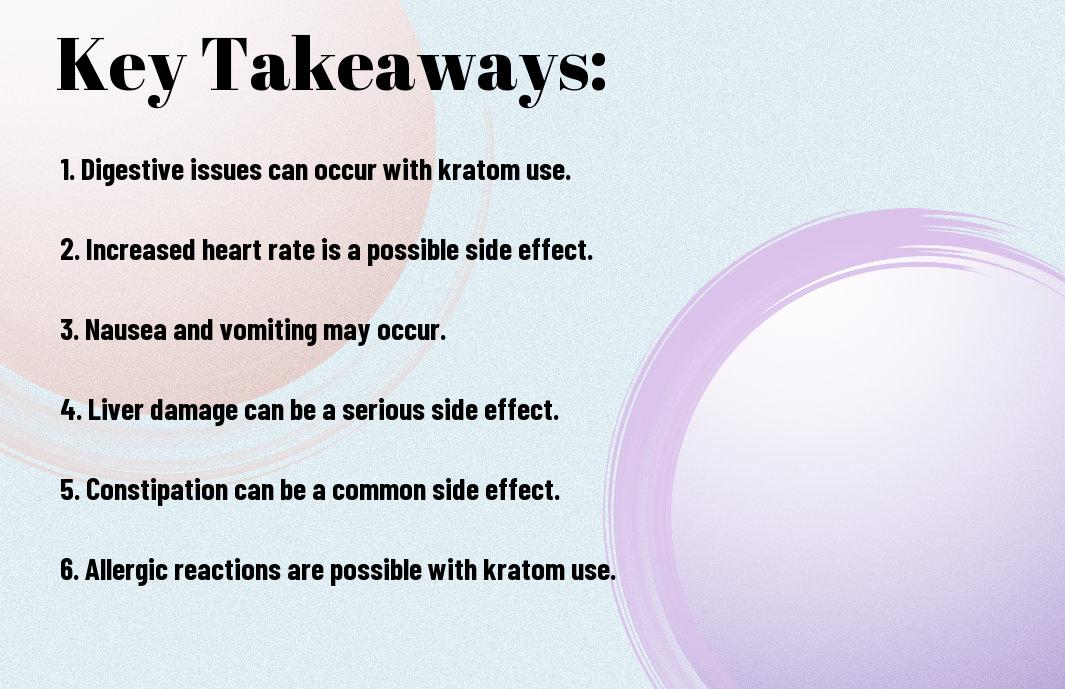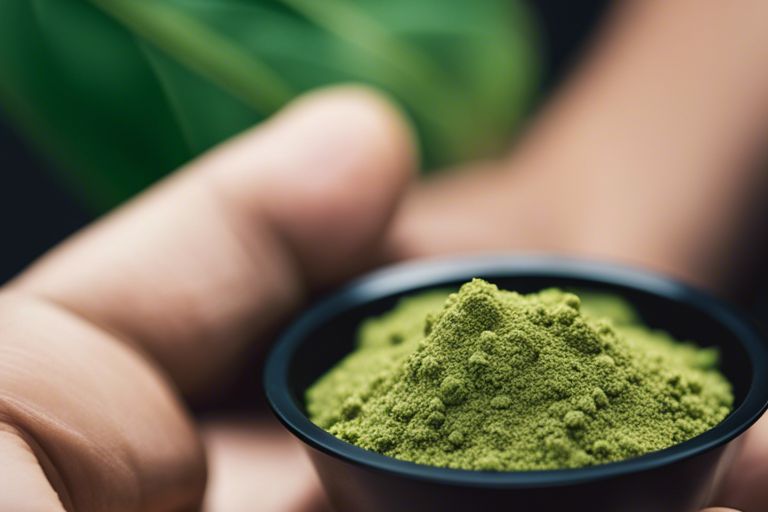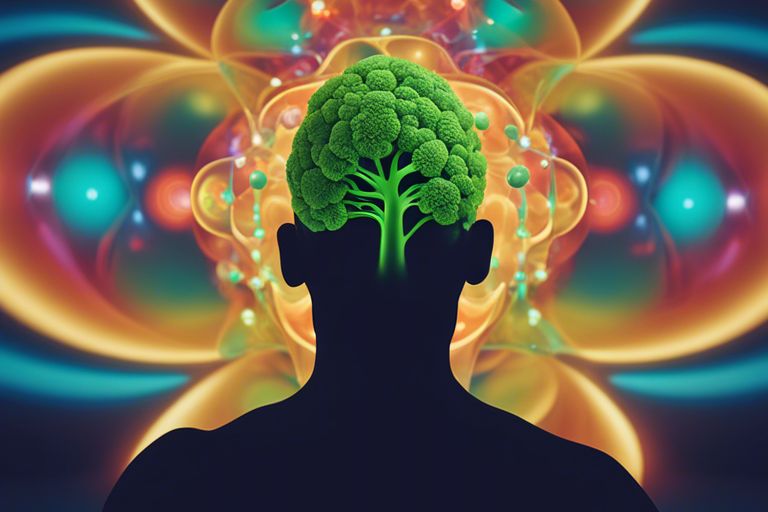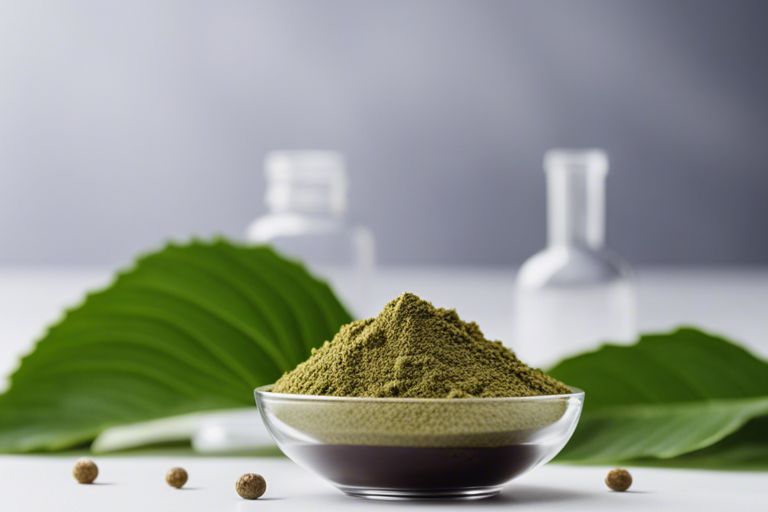Substance like kratom, a natural herb with stimulating and pain-relieving effects, can have serious side effects when misused. Common side effects of kratom include nausea, constipation, insomnia, and loss of appetite. In more severe cases, kratom consumption can lead to respiratory depression, seizures, and even coma. It is crucial for individuals considering its use to be aware of these potential dangers and to use it responsibly under medical supervision.
Key Takeaways:
- Kratom can cause physical side effects: Some common physical side effects of kratom include nausea, constipation, increased heart rate, and dry mouth.
- Kratom may lead to psychological side effects: Users may experience mental health issues such as anxiety, agitation, and hallucinations when consuming kratom.
- Potential for addiction and dependency: Prolonged use of kratom may lead to addiction and dependency, causing withdrawal symptoms when usage is stopped.


What is Kratom?
Before entering into the potential side effects of kratom, it’s necessary to understand what kratom is. Kratom, scientifically known as Mitragyna speciosa, is a tropical evergreen tree native to Southeast Asia. The plant belongs to the coffee family and has been used for centuries in traditional medicine practices.
Origin and History
Any discussion about kratom would be incomplete without touching upon its origin and rich history. Kratom has been utilized for its medicinal properties in countries like Thailand, Malaysia, and Indonesia for generations. In these regions, kratom leaves were either chewed or brewed into tea to help manage pain, boost energy levels, and enhance mood.
Chemical Composition
Kratom contains over 40 compounds, with the two most prevalent ones being mitragynine and 7-hydroxymitragynine. These alkaloids interact with the brain’s opioid receptors, producing effects similar to opioids but with less severe respiratory depression. The unique chemical composition of kratom is what makes it a subject of interest and scrutiny within the medical community.
History: Kratom has a long history of traditional use, with anecdotal reports of its benefits ranging from pain relief to relaxation. However, due to its opioid-like properties, kratom has also faced regulatory challenges and safety concerns in more recent years.
Common Side Effects
Even though kratom is touted for its potential health benefits, it is vital to be aware of the common side effects associated with its use. These side effects can range from mild to severe, depending on various factors such as dosage, frequency of use, and individual tolerance levels.
Mild Side Effects
Effects such as dizziness, nausea, and constipation are commonly reported by kratom users. These mild side effects are usually temporary and tend to subside as the body adjusts to the substance. It’s important to stay hydrated and monitor your dosage to minimize these effects.
Moderate Side Effects
Effects like increased heart rate, loss of appetite, and insomnia may occur with moderate kratom use. For instance, some users may experience mood swings or irritability. It is crucial to be mindful of these moderate side effects and adjust your kratom intake accordingly to avoid any potential negative impacts on your well-being.
Severe Side Effects
Any individual considering kratom should be aware of the potential for severe side effects such as seizures, respiratory depression, and liver damage. While these side effects are rare, they can be dangerous and require immediate medical attention if experienced. With that in mind, it is crucial to use kratom responsibly and consult with a healthcare professional before incorporating it into your wellness routine.
Short-Term Side Effects
To learn more about the short-term side effects of kratom, visit Kratom: Dangers, Side Effects, and Overdose.
Nausea and Vomiting
Short-term side effects of kratom may include nausea and vomiting. Users have reported experiencing these symptoms, especially when taking high doses or using kratom for an extended period. Nausea and vomiting can be unpleasant and may lead to dehydration if not managed properly. It is important to be mindful of dosages and to stay hydrated while using kratom to minimize these side effects.
Dizziness and Drowsiness
The short-term use of kratom may also cause dizziness and drowsiness. Users may feel lightheaded or overly sleepy after taking kratom. These effects can impair one’s ability to perform tasks that require focus and attention. It is advisable not to drive or operate heavy machinery while experiencing dizziness or drowsiness as a result of kratom use.
Individuals sensitive to changes in their body chemistry may experience these side effects more strongly. If you are prone to dizziness or drowsiness, it is best to start with a small dose of kratom to assess how your body reacts before increasing the amount.
Headaches and Fatigue
Another short-term side effect of kratom is headaches and fatigue. Some users have reported feeling headaches or experiencing fatigue after consuming kratom. These symptoms may be a result of dehydration, improper dosing, or individual sensitivity to the compound. It is crucial to stay hydrated and follow recommended dosages to mitigate these side effects.
If you frequently experience headaches and fatigue after consuming kratom, it is important to consult a healthcare professional to rule out any underlying health conditions that may be exacerbating these symptoms.
Long-Term Side Effects
Dependence and Addiction
Not all side effects of kratom are immediate; some can develop over time with prolonged use. Dependence and addiction are potential risks associated with long-term kratom use. Kratom interacts with the brain’s opioid receptors similarly to morphine and can lead to physical dependence when used regularly. Individuals who develop a dependence on kratom may experience withdrawal symptoms when they stop using the substance.
Liver Damage and Interaction with Medications
One long-term side effect of kratom is the potential for liver damage and interactions with medications. Some studies have linked kratom use to liver toxicity and injury. Additionally, kratom can interact with prescription medications, potentially leading to harmful effects or reducing the efficacy of the medications.
To minimize the risk of liver damage and negative interactions with medications, it’s necessary to consult a healthcare provider before using kratom, especially if you are taking other medications that could potentially interact with kratom.
Respiratory Depression
Respiratory depression is another concern associated with long-term kratom use. This side effect can be especially dangerous when kratom is used in combination with other central nervous system depressants, such as opioids or benzodiazepines. Respiratory depression can lead to difficulty breathing, low oxygen levels, and even respiratory failure.
With the potential for respiratory depression, it’s crucial to use caution when using kratom, particularly if you have pre-existing respiratory conditions or if you are taking other medications that may exacerbate this side effect.
Interactions with Other Substances
Despite its potential benefits, kratom can interact with various substances, including medications, supplements, food, beverages, and other substances of abuse. It is crucial to be aware of these interactions to avoid any adverse effects.
Medications and Supplements
On the topic of medications and supplements, it’s crucial to exercise caution when using kratom. Kratom may interact with certain medications, such as antidepressants, antipsychotics, or sedatives, leading to serious health complications. Similarly, combining kratom with supplements like St. John’s Wort or Valerian root can potentiate its effects, possibly resulting in unpredictable outcomes.
Food and Beverages
Any ingestion of kratom should also consider its interaction with food and beverages. Kratom may have a stimulating or sedating effect, depending on the strain and dosage, so consuming it with certain foods or drinks could amplify these effects. For example, mixing kratom with caffeine-containing beverages like coffee or energy drinks may lead to overstimulation or jitters.
Other Substances of Abuse
Apart from medications and supplements, kratom interactions with other substances of abuse should not be overlooked. Substances like alcohol, opioids, or benzodiazepines can intensify kratom’s sedative effects, increasing the risk of respiratory depression or overdose. Additionally, combining kratom with stimulants like cocaine or amphetamines could result in cardiovascular complications or severe agitation.
Plus, it’s important to note that the effects of mixing kratom with other substances can vary widely based on individual physiology and the specific substances involved. It’s always advisable to consult a healthcare professional before combining kratom with any other substance to ensure personal safety and well-being.
What Are the Potential Side Effects of Kratom, Including Seizures?
Many researchers have sought to explore the potential kratom and seizures link by conducting studies to better understand the side effects of this herbal supplement. While kratom has been tied to reported cases of seizures, more research is needed to fully understand the relationship between kratom use and the risk of experiencing seizures.
Managing Side Effects
Dosage and Tolerance
All individuals react differently to kratom based on their tolerance level and dosage. With any herbal supplement, it is crucial to start with a low dose and gradually increase until the desired effects are achieved. It is important to be mindful of your body’s response and tolerance levels to avoid potential side effects.
Combining with Other Herbs
With caution, kratom can be combined with other herbs to enhance its effects. However, it is necessary to research the interactions between kratom and any other herbs before consumption. Some herbs may have synergistic effects, while others can lead to adverse reactions.
Other herbs like chamomile or lavender can be calming when combined with kratom, potentially reducing anxiety or promoting better sleep. It is necessary to consult with a healthcare professional before combining kratom with any other herbs to ensure safety.
Seeking Medical Attention
Attention should be sought if any severe side effects of kratom consumption occur, such as difficulty breathing, hallucinations, or severe nausea. It is crucial to seek immediate medical attention to address any concerning symptoms and receive appropriate treatment.
Seeking guidance from a healthcare provider is recommended if you experience persistent side effects or are unsure about the effects of kratom on your body. Monitoring your symptoms and seeking medical advice can help mitigate any potential risks associated with long-term kratom use.
Conclusion
So, it is evident that kratom, while offering potential benefits such as pain relief and mood enhancement, also poses various side effects that users should be aware of. These side effects range from mild symptoms like nausea and dry mouth to more serious issues like addiction and respiratory depression. It is necessary for individuals considering using kratom to carefully weigh the potential risks and benefits before incorporating it into their routine.
Furthermore, as research on kratom continues to evolve, it is important for users to stay informed and consult with healthcare professionals regarding any concerns or questions they may have. By being educated and aware of the potential side effects of kratom, individuals can make informed decisions about its use and prioritize their health and well-being.
FAQ
Q: What is kratom?
A: Kratom is a tree native to Southeast Asia, known for its leaves which are used for medicinal and recreational purposes.
Q: What are the common side effects of kratom?
A: Common side effects of kratom may include nausea, constipation, dizziness, and sweating.
Q: Can kratom cause addiction?
A: Yes, kratom has the potential to cause addiction, especially with prolonged and frequent use.
Q: Are there serious side effects of kratom use?
A: In some cases, high doses of kratom can lead to respiratory depression, seizures, and even coma.
Q: How can the side effects of kratom be managed?
A: To manage the side effects of kratom, it is important to use it in moderation, stay hydrated, and consult with a healthcare professional if any adverse reactions occur.










